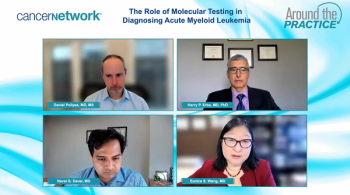
A panel of clinical experts provide insights about the importance of molecular and cytogenetic testing in diagnosing acute myeloid leukemia and in determining the best treatment plan.

Your AI-Trained Oncology Knowledge Connection!


A panel of clinical experts provide insights about the importance of molecular and cytogenetic testing in diagnosing acute myeloid leukemia and in determining the best treatment plan.

Harry P. Erba, MD, PhD, discusses the need to retest for mutations including IDH1, IDH2, FLT3, NPMI, and KMT2A rearrangement for patients with relapsed or refractory acute myeloid leukemia.

Eunice S. Wang, MD, offers an overview of common barriers to performing molecular testing in community practices, including uncertainty about which tests to perform and the wait times for results.

Daniel Pollyea, MD, MS, discusses how he assesses patients with newly diagnosed acute myeloid leukemia for the best first-line therapy, including the role of intensive induction chemotherapy.

The panel discuss the need for personalized treatment approaches for young, fit patients with newly diagnosed acute myeloid leukemia, as well as when transplant should be considered.

Eunice S. Wang, MD, shares first-line treatment approaches for patients with NPM1-mutant AML, discussing current clinical data.

Daniel Pollyea, MD, MS, discusses first-line treatment options for patients with AML with KMT2a rearrangements.

The expert panel review recently reported data from clinical trials evaluating menin inhibitors, including ziftomenib and revumenib, in the treatment of relapsed AML and how these treatments may fit into first-line settings.

Experts on acute myeloid leukemia share clinical insights on first-line combination therapies, including the potential role of menin inhibitors in this setting.

The expert panel discuss emerging data on menin inhibitors in the second-line treatment of AML, including an overview of the KOMET-001 trial evaluating ziftomenib.

The panel of experts share their thoughts on where menin inhibitors will offer the most benefit in the overall treatment regimen for patients with AML.

The expert panel provide clinical insights on which patients with AML may benefit the most from treatment with menin inhibitors.

Experts on acute myeloid leukemia offer closing thoughts and discuss emerging treatments in the field.

Naval G. Daver, MD, reviewed current treatment options in acute myeloid leukemia, specifically the use of menin inhibitors in the space.